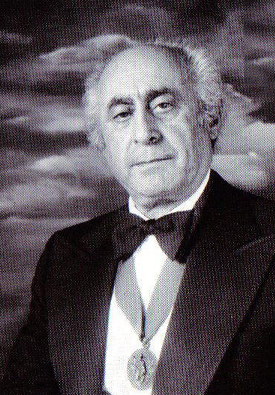
Masoud Harunian was born into a devoted Jewish family in 1922 in the Oudlajan district, Tehran, Iran. His father was Haji Yehuda Harunian—a well-known merchant who migrated from Kashan to Tehran when he was a young adult.
In Tehran, Masoud completed his elementary studies at Alliance School and his high school education at the Tehran American College (known as Alborz School). Afterward, he joined Rabbi Haeem More for religious education, where he learned Hebrew as well. Immediately after completing his education, Masoud started work at his father’s store in the Tehran bazaar. Seven years later, Masoud decided to participate in the university entrance exam, however, considering the long educational gap he had, passing the exam required exceptional determination. Masoud participated in the university entrance exam and was accepted to the Faculty of Law of Tehran University. He obtained his Bachelor’s degree in Law and Political Sciences in 1949.
Masoud was an ardent researcher and was gifted in learning languages. He spoke English, French, and Hebrew fluently. His education and his fluency in various languages became the means for him to serve his community culturally and in legal issues. Meanwhile, he also maintained his father’s business of exporting Persian rugs, honoring his father’s request.
Masoud became an expert in Persian rugs. He garnered respect among rug exporters and became a member of the administration board of the union. Since he had studied law as well, he was often summoned by the judiciary as an official justice ministry expert.
Masoud Harunian married Pari Kohan, who was the maternal niece of Yuosef Kohan. They had four sons.
He became a member of the Tehran Jewish Committee and subsequently a member of its legal department, where he played a significant role. He later joined Bet Din (i.e. Center of Religious Legislation) and served next to the late Yuosef Kohen, Rabbi Yedidia Shofet, Rabbi Uriel Davidi, Rabbi Uorsharga, and other religious scholars.
Masoud Harunian helped in the founding of the [Jewish] Arbitration Committee in 1973 and was himself an active member of it. He arbitrated on family, financial, and business disputes, in addition to other issues. He dedicated part of his after-office hours to arbitrate between Jews and non-Jews.
In the early 1970s, Masoud Harunian became the Chairman of the Kheyrkhah Foundation Hospital, called the Dr. Sapir Hospital, in Tehran. He solved the financial deficit that the hospital had been experiencing and encouraged many Jewish philanthropists and also government officials to support the renovation of the hospital.
As a result of the 1979 revolution in Iran, Masoud Harunian reluctantly immigrated to the United States, where he settled in Los Angeles. Soon, due to his fluency in English, he became engaged in helping Iranian Jewish immigrants with the inconveniences they faced. He represented immigrant Jews and other Jewish organizations in the United States.
Masoud continued his Persian rug business in Los Angeles to sustain his own life. He was quickly recognized for his expertise in rugs. Masoud Harunian used every opportunity to advertise traditional Persian art to the American people. For instance, he held several exhibitions at UCLA and other academic events to showcase Persian rugs, and delivered lectures on the matter. He was asked to become a member of the Official American Rug Experts Community and an expert for insurance companies.
Masoud Harunian established the first registered and official non-profit Jewish organization, called the “Iranian Jews of California Cultural Organization”, in 1978. A year later, he was elected as the Chairman of the administration board of the organization, where he served for almost a quarter of a century. He had significant achievements in promoting the culture of Iranian Jews, the most important of which include:
Negotiation with the American government for simplifying the procedure of issuing immigration visa and work permit for Jewish students; granting fiduciary loans to students; honoring famous national Iranian figures; honoring teachers, lecturers, and religious leaders; publishing books of various authors; conducting scientific, social, cultural, and medical seminars; funding religious ceremonies (Rosh Hashanah and Yom Kippur) every year with his own wealth; conducting Torah recitation competitions for teenagers, which helped considerably in preserving the tradition of Torah recitation in the traditional Iranian Jewish tone. In addition to his business and social service, Masoud Harunian expanded his philanthropic activities to other fields.
He was elected as the Head of the Iranian Rancho Park Rotary Club for 1991-1992.
As Iranian Jewish migration to Los Angeles increased, Masoud Harunian realized the need for preserving Jewish traditions among them. He, therefore, proposed and helped fund the establishment of “The friends of the Tort Haeem Schools”. The organization later became one of the main cultural and religious centers of the Iranian Jews of Los Angeles.
Later, Professor Amnon Nethser also migrated to Los Angeles. The two were acquainted with each other and collaborated in further cultural activities.
Meanwhile, Masoud Harunian occasionally delivered lectures in cultural institutions since he was a cultural activist, and published Persian articles in Los Angeles and New York based journals, named Shoofar. He had also collected his works, including articles, lectures, and a biography of several contemporary Jews. The collection was published in Los Angeles in 2003 as a book titled, “Famous academic Iranian Jews.”
The sudden death of his eldest son, Dan, became a heavy psychological burden for him. However, he remained committed to serving the Jewish community, and in 2005 published another book titled “A report of a half of a century”, just one year before his death. The book was a collection on the settlement and presence of Jews in California, their activities there, and the social and cultural contributions of the Cultural Institution of Iranian Jews.
In recognition of his cultural and social services, Masoud Harunian was awarded many prizes and certificates from Jewish cultural centers around the world, as a symbol of a quarter of a century of service to the Iranian Jewish community. Some of the awards he received include: a Certificate of Gratitude from the National Treasury of the Tehran Jewish Committee, a certificate from the municipality of Los Angeles and Beverley Hills, an Expression of Gratitude from the Cultural Institution of Iranian Jews, a “Ten Commandments Certificate” tablet from the members of the Administration Board of the Cultural Institution, a Certificate and a Prize-hammer from the Chairman of the Rotary Club, and a Certificate of Honor by the California State Senate.
Masoud Harunian passed away in 2006, aged 84.


 فارسی
فارسی